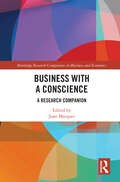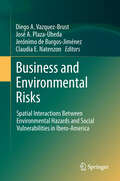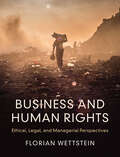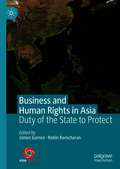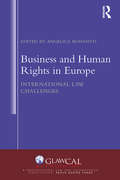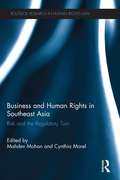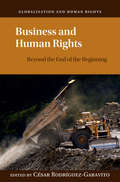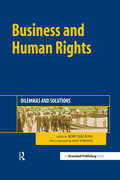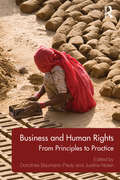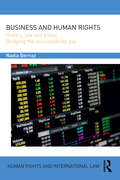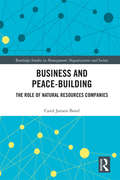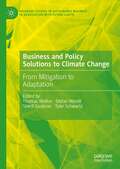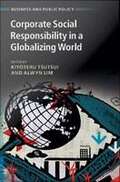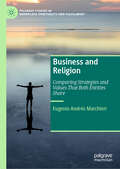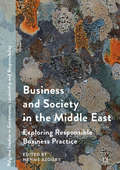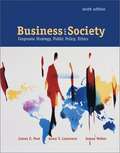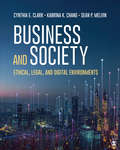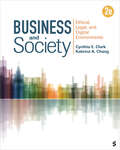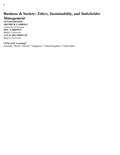- Table View
- List View
Business With a Conscience: A Research Companion (Routledge Research Companions in Business and Economics)
by Joan MarquesPracticing business with a conscience leaves no sector untouched. It trickles into how we treat our employees, approach our work in general, address stakeholders, engage in accounting, financial, and production management practices, implement and manage information technology, communicate on a direct and indirect basis, and market what we stand for. Business has encountered an interesting evolution in the first two decades of the twenty-first century, with social media as a catalyst toward greater understanding regarding the critical value of soft skills, workplace diversity, change readiness, moral responsibility, sustainable awareness, and a general socially responsible mind-set. This amalgamate spirit of business as we envision it in the near and far future has found its way in all segments of business education, research, and practice. Adhering to the global trend of increased responsibility and evoking a constructive change in the narrative of business, this Research Companion serves as a critical reference work to business scholars and practitioners in various settings. It brings together contributing scholars from multiple business areas, from a variety of cultures and locations of the world, in order to achieve a reference work that will find expansive appeal. Including insights from the broad business spectrum ranging from internal managerial practices to strategic applications, including international sensitivity, this volume highlights the urgency for increased awareness in business decision-making on all fronts. It will be of great value to researchers, academics, practitioners, and students in the fields of corporate social responsibility, business ethics, leadership, organizational studies, and entrepreneurship.
Business and Buddhism
by Joan MarquesBusiness and Buddhism explores alternative ways of leading in the aftermath of the Great Recession and the many stories of fraud and greed that emerged. The book explores shifts in business perspectives as more value is placed on soft skills like emotional intelligence and listening, and introduces the reader to the principles in Buddhist philosophy that can be applied in the workplace. Buddhist practices are increasingly understood as spiritual, rather than religious per se. In fact, Buddhism is alternately referred to as a philosophy or psychology. In this book, Marques explores the value of applying the positive psychology of Buddhism to work settings. She outlines the ways in which it offers highly effective solutions to addressing important management and organizational behavior related issues, but also flags up critical areas for caution. For example, Buddhism is non-confrontational, and promotes detachment. How can business leaders negotiate these principles in light of the demands of modern day pressures? The book includes end of chapter questions to promote reflection and critical thinking, and examples of Buddhist leaders in action. It will prove a captivating read for students of organizational behavior, management, leadership, diversity and ethics, as well as business consultants.
Business and Environmental Risks: Spatial Interactions Between Environmental Hazards and Social Vulnerabilities in Ibero-America
by Diego A. Vazquez-Brust Claudia E. Natenzon Jerónimo de Burgos-Jiménez José A. Plaza-ÚbedaBased on detailed research funded across two continents and involving universities in Argentina, Spain and the UK, this book sets out an innovative, multidisciplinary approach to assessing both environmental and social risks in a given territorial area. Using data from a number of Ibero-American nations, the study combines environmental, socio-economic and geographic factors to construct a set of spatial and technical indicators that measure the social vulnerability and industrial hazardousness of a defined area. Aggregating these indicators in a geographic information system (GIS) allows researchers to assess the potential risk to which a certain area and its population are subject as a result of the environmental deterioration caused by co-located industrial activity.
Business and Human Rights Business and Human Rights: Ethical, Legal, and Managerial Perspectives
by Florian WettsteinThe first of its kind, this comprehensive interdisciplinary textbook in Business and Human Rights (BHR) connects and integrates themes, discussions, and issues in BHR from both legal and non-legal perspectives, and provides a solid foundation for cross-disciplinary conversations. It equips students, teachers, and scholars with the necessary knowledge to navigate and advance evolving BHR debates, and fosters a thorough understanding of the academic foundations, evolving policy spaces, and practical approaches in BHR. Short cases throughout translate conceptual insights into practical solutions. Study, reflection, and discussion questions help readers to consolidate and synthesize their understanding of the material and provide stimulating frameworks for debate in the classroom and beyond. The book features a collection of online resources to support students and instructors in their preparation for courses and assignments.
Business and Human Rights in Asia: Duty of the State to Protect
by Robin Ramcharan James GomezThis book examines the State’s duty to protect human rights in Asia amidst rising concern over the human rights impact of business organisations in the region, a topic which has hitherto been understudied. It analyses a range of inter-connected issues: the advent of international standards, the UN Guiding Principles on Business and Human Rights, the challenges inherent in the formulation of National Action Plans on business and human rights, the need for improved legislation and policies, access to remedies, and conflicts with indigenous peoples over business activities. The book also covers innovative themes such as BHR in the era of smart cities, ethical consumer behavior, and a human rights management system, which are emerging areas of enquiry in this field concluding with a range of critical issues to be addressed, including the need for an assessment of COVID-19 pandemic’s impact on BHR in Asia and beyond. This book is part of Asia Centre’s exploration of the nascent regional human rights architecture that is facing significant obstacles in protecting human rights and showcases the progress achieved and the ongoing challenges across Asia.
Business and Human Rights in Europe: International Law Challenges (Transnational Law and Governance)
by Angelica BonfantiTransnational business activities are important drivers of growth for developing and the least developed countries. However, they can also negatively impact the enjoyment of human rights. In some cases, multinational enterprises (MNEs) have even been accused of grave human rights abuses in the territory of the states where their subsidiaries operate. Since the parent companies of many MNEs are incorporated under the law of European states, those countries’ domestic law and the European legal framework play a crucial role in establishing how their activities should be conducted – also throughout their supply chains – and which remedies will be available when corporate human rights violations occur. In recent years, the European Union, the Council of Europe and their Member States have been adopting policies and legislation to ensure respect for human rights by businesses and have developed a body of related case law. These legal instruments can be considered the European responses to the challenges posed at international-law level, and they constitute the focus of research of this book. Through its collected chapters – written by scholars and practitioners under the direction of the editor, Angelica Bonfanti – the book identifies the European solutions to the business and human rights international legal issues, provides an overall assessment of their effectiveness, and examines their potential evolution.
Business and Human Rights in Southeast Asia: Risk and the Regulatory Turn (Routledge Research in Human Rights Law)
by Mahdev Mohan Cynthia MorelBusiness and human rights has emerged as a distinct field within the corporate governance movement. The endorsement by the United Nations Human Rights Council of a new set of Guiding Principles for Business and Human Rights in 2011 reinforces the State’s duty to protect against human rights abuses by third parties, including business; the corporate responsibility to respect human rights; and greater access by victims to effective remedy, both judicial and non-judicial. This book draws on the UN Guiding Principles and recent national plans of action, to provide an overview of relevant developments within the ASEAN region. Bridging theory and practice, the editors have positioned this book at the intersection of human rights risk and its regulation. Chapter authors discuss the implications of key case-studies undertaken across the region and various sectors, with a particular focus on extractive industries, the environment, and infrastructure projects. Topics covered include: due diligence and the role of audits; businesses’ responsibilities to women and children; and the mitigation of human rights risks in the region's emerging markets. The book sheds light on how stakeholders currently approach business and human rights, and explores how the role of ASEAN States, and that of the institution itself, may be strengthened. In doing so, the book identifies critical challenges and opportunities that lie ahead for the region in relation to business and human rights. This book will be of excellent use and interest to scholars, practitioners and students of human rights, business and company law, international law, and corporate governance.
Business and Human Rights: Beyond the End of the Beginning (Globalization and Human Rights)
by César Rodríguez-GaravitoThe regulation of business in the global economy poses one of the main challenges for governance, as illustrated by the dynamic scholarly and policy debates about the UN Guiding Principles on Business and Human Rights and a possible international treaty on the matter. This book takes on the conceptual and legal underpinnings of global governance approaches to business and human rights, with an emphasis on the Guiding Principles (GPs) and attention to the current treaty process. Analyses of the GPs have tended to focus on their static dimension, such as the standards they include, rather than on their capacity to change, to push the development of new norms, and practices that might go beyond the initial content of the GPs and improve corporate compliance with human rights. This book engages both the static and dynamic dimensions of the GPs, and considers the issue through the eyes of scholars and practitioners from different parts of the world. Offers the first systematic effort by prominent business and human rights scholars and practitioners to take stock of the GPs and the broader theoretical, legal, and policy debates and initiatives they have sparked. Contributes to a dynamic and timely debate that has gained widespread attention in academic and policy circles regarding the protection of human rights in business proceedings. Features chapters by scholars and practitioners from across the globe.
Business and Human Rights: Dilemmas and Solutions
by Mary Robinson Rory SullivanThe end of the Cold War and the virtual disappearance of communism have completely altered the world economy. The supply chains of supermarkets and consumer goods industries have spread ever more widely and deeply into Asia, Africa and South America, while oil, mining and financial companies, among many others, have invested heavily in countries that were previously denied to them by political or ideological barriers.While companies have seized the opportunities presented by globalisation, they have in many cases been completely unprepared for the risks presented by their headlong rush into these new markets. Companies have found themselves and their business partners operating in countries where corruption, injustice, internal conflict and human rights violations are rife. An increasingly alert and critical world has acted as watchdog, highlighting corporate malpractice and the links between corporations and repressive regimes.It has increasingly been argued that companies have responsibilities for the protection and promotion of human rights. These arguments are, at least to some extent, accepted by companies. Yet, despite the increasing use of human rights language in public policy discourses, the expectations of companies remain unclear. That is, what are the ethical imperatives? What are the legal expectations? How far does responsibility extend? What can companies actually do in practice? The debate is further complicated by the range of actors (companies, governments, international institutions, local communities, non-governmental organisations [NGOs], trade unions, consumers) involved; by debates around free trade versus and fair trade; by the discussion of the specific role of governments; and by questions about the relative merits of regulation and self-regulation.Business and Human Rights provides an analysis of the relationship between companies and human rights in the context of globalisation. The analysis is in two parts. The first maps the reasons (financial, ethical, regulatory) why human rights have become a business issue. However, simply because there are reasons why companies should be concerned about human rights, this does not say what companies should or could do. Therefore, the second part of the book looks at the practical experiences of companies in responding to specific human rights issues in the context of their own operations, in their supply chains and in specific countries. These case studies, many of which have not been previously published or analysed from the perspective of human rights, provide important insights into questions such as: How do companies organise themselves to respond to human rights challenges? What have the experiences been-positive and negative? How have companies responded to specific situations? What are the roles and responsibilities of other actors: government, trade unions, NGOs? What are the limits to responsibility?In this outstanding collection, Rory Sullivan has drawn together leading thinkers and actors from the debate on business and human rights, to establish how far the business and human rights debate has evolved, and explore the many complex questions around roles, responsibilities and solutions that remain to be answered.
Business and Human Rights: From Principles to Practice
by Dorothée Baumann-Pauly Justine NolanIn a global economy, multinational companies often operate in jurisdictions where governments are either unable or unwilling to uphold even the basic human rights of their citizens. The expectation that companies respect human rights in their own operations and in their business relationships is now a business reality that corporations need to respond to. Business and Human Rights: From Principles to Practice is the first comprehensive and interdisciplinary textbook that addresses these issues. It examines the regulatory framework that grounds the business and human rights debate and highlights the business and legal challenges faced by companies and stakeholders in improving respect for human rights, exploring such topics as: the regulatory framework that grounds the business and human rights debate challenges faced by companies and stakeholders in improving human rights industry-specific human rights standards current mechanisms to hold corporations to account future challenges for business and human rights With supporting case studies throughout, this text provides an overview of current themes in the field and guidance on practical implementation, demonstrating that a thorough understanding of the human rights challenges faced by business is now vital in any business context.
Business and Human Rights: History, Law and Policy - Bridging the Accountability Gap (Human Rights and International Law)
by Nadia BernazBusiness corporations can and do violate human rights all over the world, and they are often not held to account. Emblematic cases and situations such as the state of the Niger Delta and the collapse of the Rana Plaza factory are examples of corporate human rights abuses which are not adequately prevented and remedied. Business and human rights as a field seeks to enhance the accountability of business – companies and businesspeople – in the human rights area, or, to phrase it differently, to bridge the accountability gap. Bridging the accountability gap is to be understood as both setting standards and holding corporations and businesspeople to account if violations occur. Adopting a legal perspective, this book presents the ways in which this dual undertaking has been and could be further carried out in the future, and evaluates the extent to which the various initiatives in the field bridge the corporate accountability gap. It looks at the historical background of the field of business and human rights, and examines salient periods, events and cases. The book then goes on to explore the relevance of international human rights law and international criminal law for global business. International soft law and policy initiatives which have blossomed in recent years are evaluated along with private modes of regulation. The book also examines how domestic law, especially the domestic law of multinational companies’ home countries, can be used to prevent and redress corporate related human rights violations.
Business and Legal Forms for Illustrators (Business And Legal Forms Ser.)
by Tad CrawfordThe fourth edition of this popular guide contains twenty-nine of the most essential business and legal forms to meet the everyday needs of today’s illustrators. Updated throughout, new forms include a promissory note, releases, and an agreement to arbitrate. Each form is accompanied by step-by-step instructions, advice on standard contractual provisions, and unique negotiation checklists for making the best deal. Included are:Estimate Confirmation of Assignment Invoice Illustrator-Agent Contract Book Publishing Contract Collaboration Contract Contract for the Sale of an Artwork Contract for Receipt and Holding of Artwork Illustrator-Gallery Contract with Record of Consignment and Statement of Account Licensing Contract to Merchandise Images Release Form for Models Property Release Permission Form Nondisclosure Agreement for Submitting Ideas Copyright Transfer Form Application for Copyright Registration of Artwork License of Rights and Electronic Rights Contract with an Independent Contractor Trademark Application Commercial Lease Sublease Lease AssignmentThe collection provides a password and link to a supplemental website, which contains all the discussed forms for both the PC and Mac platforms. Thorough discussions of legal issues relevant to the industry make this a must-read for any illustrator-established or starting out.Allworth Press, an imprint of Skyhorse Publishing, publishes a broad range of books on the visual and performing arts, with emphasis on the business of art. Our titles cover subjects such as graphic design, theater, branding, fine art, photography, interior design, writing, acting, film, how to start careers, business and legal forms, business practices, and more. While we don't aspire to publish a New York Times bestseller or a national bestseller, we are deeply committed to quality books that help creative professionals succeed and thrive. We often publish in areas overlooked by other publishers and welcome the author whose expertise can help our audience of readers.
Business and Legal Forms for Industrial Designers
by Tad Crawford Carl W. Battle Eva Doman BruckForty-five essential forms and checklists-all ready to copy and put to immediate use in any industrial design studio-are provided here. Each form includes step-by-step instructions and can be used as is, or easily tailored to meet a specific business situation. Some of the forms include jobs master index, project plan and budget, time sheet, creative log, initial survey, estimate request form, work change order, collection letters, and much more. Allworth Press, an imprint of Skyhorse Publishing, publishes a broad range of books on the visual and performing arts, with emphasis on the business of art. Our titles cover subjects such as graphic design, theater, branding, fine art, photography, interior design, writing, acting, film, how to start careers, business and legal forms, business practices, and more. While we don't aspire to publish a New York Times bestseller or a national bestseller, we are deeply committed to quality books that help creative professionals succeed and thrive. We often publish in areas overlooked by other publishers and welcome the author whose expertise can help our audience of readers.
Business and Management Practices in South Asia: A Collection Of Case Studies
by Vijay Pereira Arijit SikdarThis book presents case studies of South Asian companies that have strategic business implications, highlighting the complex interplay of business and social dynamics in South Asia. This region is a wide agglomeration of very different countries that share somewhat common cultures and issues and yet it is torn apart by religion and politics. There is an abundance of local entrepreneurship but a widespread institutional void. The book investigates how local companies survive and thrive in this environment and discusses those companies that have withstood the competitive pressure of MNCs, depicting their management and business practices. In today’s world, where multinationals are so omnipresent that their management and business practices are considered as the de facto recipe for success, there is a need to have an alternative view that challenges the ubiquitousness of multinational management practices. The case studies in this book focus on the business and management practices of local organizations in South Asia and thus provide that alternative viewpoint of how to achieve success in South Asia. Exposing readers to a local perspective on doing business in South Asia, it is a valuable resource for students and practitioners of management.
Business and Peace-Building: The Role of Natural Resources Companies (Routledge Studies in Management, Organizations and Society)
by Carol BondIn a world struggling to adapt to seismic social and environmental changes, the time is now for businesses to prioritise creating local conditions of peace. This book builds on original research foregrounding ‘peace’ as a core business outcome for natural resources industries. Especially in non-warlike situations where natural resources industries have exacerbated or caused conflict, foregrounding peace as a core business outcome can bring substantial benefits. Peace is a concept external and internal stakeholders understand. Consequently, research shows that when natural resources sector CSR professionals start reframing their day-to-day decisions in terms of peace outcomes, they are more likely to create efficient and cost-effective solutions to environmental, social and economic business challenges. This book provides both theory and practical suggestions for how to reframe day-to-day CSR activities of natural resources companies as peace-focused, business decisions. Especially in the remote and rural regions of the world where natural resources industries have the greatest impact, businesses can lead the way in contributing to conditions of peace while bringing much needed resources to market.
Business and Policy Solutions to Climate Change: From Mitigation to Adaptation (Palgrave Studies in Sustainable Business In Association with Future Earth)
by Thomas Walker Sherif Goubran Stefan Wendt Tyler SchwartzThis edited book aims to ignite both an academic and practitioner-oriented discussion regarding the question how the business and government sector can adapt to today’s fast-changing climate. Specifically, the collection seeks to explore how businesses and policy makers can prepare for a world where freshwater is scarce, extreme weather events are common, floods and wildfires are frequent, and global sea levels rise by more than two meters. In addition to assessing incremental approaches, it explores strategies that employ interdisciplinary and innovative solutions to climate change adaptation. The chapters included in this book examine and propose business and policy solutions for climate-induced economic, technical, urban, and societal challenges. It draws on an international range of prominent authors and, therefore, will be of interest for academics and practitioners working in the field of sustainability management, sustainable finance, sustainable operations management, food management, strategy, and environmental management. It can also serve as a valuable guide for practitioners and policymakers in those fields.
Business and Public Policy: Corporate Social Responsibility in a Globalizing World
by Tsutsui, Kitoyeru and Lim, Alwyn Kitoyeru Tsutsui Alwyn LimWhy do corporations increasingly engage in good deeds that do not immediately help their bottom line, and what are the consequences of these activities? This volume examines these questions by drawing on historical documents, interviews, qualitative case comparison, fieldwork, multiple regression, time-series analysis and multidimensional scaling, among others. Informed by neoinstitutionalism and political economy approaches, the authors examine how global and local dimensions of contemporary corporate social responsibility (CSR) intersect with each other. Their rigorous empirical analyses produce insights into the historical roots of suspicions concerning cross-societal economic actors, why and how global CSR frameworks evolved into current forms, how conceptions of CSR vary across societies, what motivates corporations to participate in CSR frameworks, what impacts such participation might have on corporate reputation and actual practices, whether CSR activities shield corporations from targeting by boycott campaigns or invite more criticism, and what alternative responses corporations might have to buying into CSR principles.
Business and Religion: Comparing Strategies and Values That Both Entities Share (Palgrave Studies in Workplace Spirituality and Fulfillment)
by Eugenio Andrés MarchioriThis book explores the connections between Christian religions and businesses. It examines how companies adopt tools traditionally used by churches to manage culture, strategy, and values while also exploring how churches leverage business strategies to achieve similar objectives. The author analyzes the mechanisms of influence both institutions use to internalize the "soul" of their organizations, including marketing systems, supported by real-world case studies. Later, he shows how companies like Coca-Cola behave like secular religions. He then compares how religious organizations—such as the Catholic Church, the Willow Creek Community Church, and the Jesuit Order—employ influence and business strategies similar to those of corporations like McDonald's, Mary Kay, and the consulting firm McKinsey & Co. By examining these parallels, this work reveals that business corporations and churches operate in fundamentally similar ways. Lastly, this volume estimates the monetary dimensions of what the author refers to as the &“salvation market.&” As society has become more demanding of corporate behavior, companies have responded by developing new areas—such as human resources to improve employee conditions, marketing to attract customers and talent, and the concept of stakeholders, which gave rise to a focus on ethical considerations, such as corporate social responsibility (CSR) as well as diversity and inclusion initiatives. The culmination of this process today is a strong emphasis on sustainability, showing how these new ethical values have gained prominence. Exploring organizational dynamics through a sociological lens, this book will appeal to researchers interested in organizational behavior, strategy, and marketing who seek to learn about the cultural dynamics of business and religious organizations.
Business and Society in the Middle East: Exploring Responsible Business Practice (Palgrave Studies in Governance, Leadership and Responsibility)
by Nehme AzouryThis book discusses the unique relationship between societies and businesses in the Mediterranean region, with contributions from public figures and academics from Middle Eastern and Arab societies, as well as from North America and Europe. This blend of expertise and knowledge focuses on common business practices and their effect on society in Mediterranean countries, and aims to create a bridge between the two. Considering the cultural, social, political, legal and economic impacts and variety, Business and Society in the Middle East is a contemporary and authentic view of how local and traditional aspects of society dictate diversity and homogeneity within businesses.
Business and Society: Corporate Strategy, Public Policy and Ethics 10th ed.
by James E. Post Anne T. Lawrence James WeberPost, Lawrence, and Weber discuss the social and ethical impacts of business.
Business and Society: Ethical, Legal, and Digital Environments
by Sean P. Melvin Cynthia E. Clark Kabrina K. ChangRecipient of a 2021 Most Promising New Textbook Award from the Textbook & Academic Authors Association (TAA) Business and Society: Ethical, Legal, and Digital Environments prepares students for the modern workplace by exploring the opportunities and challenges they will face in today′s interconnected, global economy. The author team discusses legal and ethical issues throughout and uses real-world cases to provide students with a holistic understanding of stakeholder issues. Chapters on social media and citizen movements, big data and hacking, and privacy in the digital age provide in-depth coverage of how technology is transforming the relationship between organizations and consumers. Included with this title: The password-protected Instructor Resource Site (formally known as SAGE Edge) offers access to all text-specific resources, including a test bank and editable, chapter-specific PowerPoint® slides.
Business and Society: Ethical, Legal, and Digital Environments
by Sean P. Melvin Cynthia E. Clark Kabrina K. ChangRecipient of a 2021 Most Promising New Textbook Award from the Textbook & Academic Authors Association (TAA) Business and Society: Ethical, Legal, and Digital Environments prepares students for the modern workplace by exploring the opportunities and challenges they will face in today′s interconnected, global economy. The author team discusses legal and ethical issues throughout and uses real-world cases to provide students with a holistic understanding of stakeholder issues. Chapters on social media and citizen movements, big data and hacking, and privacy in the digital age provide in-depth coverage of how technology is transforming the relationship between organizations and consumers. Included with this title: The password-protected Instructor Resource Site (formally known as SAGE Edge) offers access to all text-specific resources, including a test bank and editable, chapter-specific PowerPoint® slides.
Business and Society: Ethical, Legal, and Digital Environments
by Cynthia E. Clark Kabrina K. ChangRecipient of a 2021 Most Promising New Textbook Award from the Textbook & Academic Authors Association (TAA) Business and Society: Ethical, Legal, and Digital Environments, Second Edition prepares students for the modern workplace by exploring the opportunities and challenges that individuals and businesses face in today′s increasingly global and digital world. Authors Cynthia E. Clark and Kabrina K. Chang present unique chapters on social media, big data and hacking, and privacy, diving deeper into the new legal and ethical challenges that are unleashed by our society′s use of and dependence on technology. Real-world case studies, ethical dilemmas, and point-counterpoint debates provide students with hands-on opportunities to apply chapter concepts and develop critical thinking skills as they explore the relationship among businesses, their stakeholders, and their shareholders. The Second Edition includes new cases and expanded coverage of global issues, the future of work, artificial intelligence and consumer rights.
Business and Society: Ethical, Legal, and Digital Environments
by Cynthia E. Clark Kabrina K. ChangRecipient of a 2021 Most Promising New Textbook Award from the Textbook & Academic Authors Association (TAA) Business and Society: Ethical, Legal, and Digital Environments, Second Edition prepares students for the modern workplace by exploring the opportunities and challenges that individuals and businesses face in today′s increasingly global and digital world. Authors Cynthia E. Clark and Kabrina K. Chang present unique chapters on social media, big data and hacking, and privacy, diving deeper into the new legal and ethical challenges that are unleashed by our society′s use of and dependence on technology. Real-world case studies, ethical dilemmas, and point-counterpoint debates provide students with hands-on opportunities to apply chapter concepts and develop critical thinking skills as they explore the relationship among businesses, their stakeholders, and their shareholders. The Second Edition includes new cases and expanded coverage of global issues, the future of work, artificial intelligence and consumer rights.
Business and Society: Ethics, Sustainability and Stakeholder Management (Mindtap Course List)
by Archie B. Carroll Jill Brown Ann K. BuchholtzBUSINESS AND SOCIETY employs a stakeholder management framework. This framework emphasizes a business's social, legal, political, and ethical responsibilities to both external and internal groups that have a stake, or interest, in that business. It is a fundamental goal of the course that students really get that responsible business decision makers strive to balance and protect the interests of various stakeholders-investors, employees, community, environment, etc. An emphasis is also placed on the fact that one needs to understand that business situations will continually arise that will truly test ones values and ethics. <p><p> BUSINESS AND SOCIETY not only exposes students to diverse and important stakeholder and ethical frameworks for considering and protecting stakeholder interests, through its use of cases and other real-world applications, this text enhances the precision with which students think about and practice ethical decision making. Opportunities to apply stakeholder and ethical systems to specific business problems abound, and questions are provided with all cases and applications to focus student reasoning, ensuring excellent preparation for class discussions.
